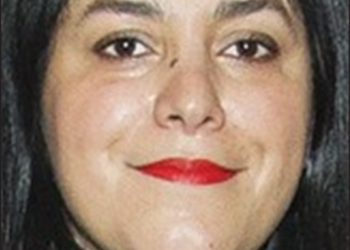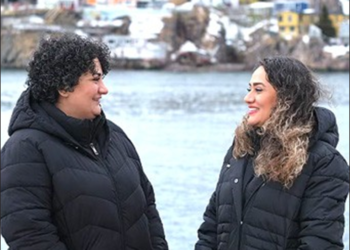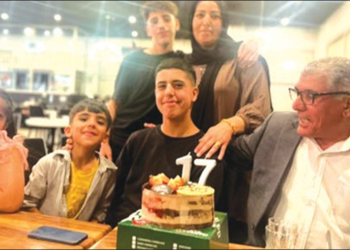Boushehry grew up in a comfortable neighborhood near a golf course in a suburb of the city. But his Iranian-born father ran a grocery store only a few blocks from the gritty school where Bushehry, 36, is immersed in the trials and troubles of teens.
The Indianpolis Star recently spent some time with Boushehry, who seems to have that special skill needed to relate to young teens who themselves have trouble relating to society as a whole.
The Star caught up with Boushehry as he stared intently at a 14-year-old girl. She admits freely that she smokes “weed” whenever she can get it. And her forearms are carved up by a latticework pattern of razor cuts.
The cuts are in various stages of healing — some scabbed over, some covered with scar tissue. In block letters, she’s even carved out two words that seem to sum up how she feels about the world and herself: “F— You.”
Seated in his office at Emma Donnan Middle School, Bou-shehry has seen a steady stream of confusion, pain and adolescent angst parade through his door.
The Star cites the man-child and the mouthy little boy — the bully and the bullied — whom Boushehry counseled at the same time, as if they were an embittered old married couple.
There was a frequently truant 13-year-old girl who complained of being sick. Yet, after questioning in Boushehry’s hot seat, she admitted that she was really just angry at her mother for making her wear a frumpy skirt, and at the boys who have been teasing her.
Then there was the 14-year-old boy who had been in six schools in the past three years. After staring at the floor with his head in his hands, he declared that he had given up on school.
“There’s nothing you can do,” he told Boushehry, whose named is easily pronounced by Americans as BOO-sherry.
He hears just about every topic in the social worker’s manual — students who need tutoring, students grieving from the loss of siblings or of parents, students who may be victims of abuse or neglect.
In one case, he talked to a girl whose parents have a history of violent fights. He asked her if, in the event things got out of hand, she knew how to call 911, and if she had an escape plan. “We have to empower the child,” he said.
The Star commented that students at Emma Donnan “show up for school weighed down by more than a backpack.” Sometimes their issues make them quiet and withdrawn, sometimes surly and disruptive, or even unwilling to go to class.
As a boy, Boushehry stocked shelves in his dad’s nearby grocery store, tended the cash register and even colored the sign for the window that said, “No shirt, no shoes, no service.” He learned things about life — and people — that he would have missed simply growing up next to the golf course.
“I just remember dealing with these kinds of kids, these kinds of families that would come into the store,” he said. “Some were very nice. Some were a little rough around the edges.”
To a certain degree, the Star said, it is an edge that Boushehry has picked up and uses to his advantage. In the hallways, he banters with the students in a way few other faculty mem-bers can.
He fist bumps the boys and calls them out if they are sporting a hickey. He chides the kids who have let their Afros get a little disheveled, saying, “Man, you need to tease that thing out.”
He asks new students what their names are, what school they came from, if they knew the social worker there. He tells them to come see him if they have any trouble. The next time he sees them he remembers their names and checks in again.
If the student starts hanging with the wrong crowd, Bou-shehry may bluntly ask: “Are you in a gang?”
If the child is sporting a new pair of Ken Griffey Nike athletic shoes, he may compliment him for the look of his “Griffeys” and receive a knowing smile in return.
If he senses a student isn’t being truthful, he’ll bark at the child to “keep it real.”
The result, guidance counselor Katee Reasoner said, is that Boushehry’s understanding of the students’ world, his use of their language, puts them at ease. “The kids really respond to him. They like him. They seek him out,” she said. “With a lot of our kids, whatever you can do to reach those kids is great. And he reaches them really well.”
Above all, it seems to give Boushehry license to deliver life’s hard truths.
To the man-child accused of bullying, he asks, “What are you doing messing with him when you’re twice his size?”
To the little guy being bullied, he pledges to address the problem — maybe even see the bigger boy expelled if the bullying keeps up — but he also offers a little friendly advice: Running your mouth at a bigger kid can sometimes end badly.
Thirteen-year-old Paige Willis sometimes needs a visit to Boushehry’s office to combat the “drama” of middle school life — the sniping of other girls, trouble with boys. “If I have a bad day, he pulls me into his office and works with me to calm down,” she said. “When I don’t want to go to class, he talks me into going to class. He walks me to class and he tells me to do good.”
Over the course of a single day last week, the Star found that Boushehry worked with 35 kids.
He rerouted two girls running the hallways during class.
He found an extra shirt for a boy who spilled a drink during lunch.
He chastised a girl he passed in the hallway because he knew she’s been missing school a lot lately.
He praised a boy who stopped by his office because, despite the boy’s penchant for punching windows and lockers, Boushehry heard the child had walked away from a potentially explosive moment a couple of days before.
These are children who may be raising themselves and raising their younger siblings, who may be sleeping on the floor because they don’t have a mattress and getting by only on what they eat at school.
“If I get a kid who missed 70 days of school last year and I get him to where he has only missed 15 days, and he has brought his F’s up to a C,” he said, “for me that’s success.”
Of course, Boushehry said, “we need to continue to build off that success, but that’s where I look at it.”
Whatever their circumstances, Boushehry urges the students he counsels to do the best with what they can control — the choices they make for themselves. “The power that they have to make choices,” he said, “I don’t think they realize it.”
Assistant Principal Karen Hastings told the Star Boushehry has a knack for showing children that the way out of poverty is to make it to high school — and then graduate. “He is always making them think about their future,” she said, “and about how you are going to get there.”
Interestingly, that is the sort of correction Boushehry once needed himself. His mother died when he was a junior in high school. He knows, as some of his students do, what it means to grieve. And to be aimless. He also found his way back after transferring to a Catholic-run high school.
“I needed a little bit of spirituality, I needed a little bit of a kick in the butt,” Boushehry said. “I had lost some direction.”
Even with his life experience, he can still find it tough to help certain kids find their way. Sometimes it’s difficult because the child doesn’t seem to want help. Sometimes the parents don’t want the help.
Two weeks ago, he tried to persuade a mother to take her daughter to the doctor. The girl had a second-degree burn on her hand—from a hot grease spill—that was pink and raw after days going untreated. The mother cursed him out for interfering.
Just a few days ago, a boy threatened to beat up Boushehry. Was the kid capable of doing it? “Yeah, he was a pretty big kid,” Boushehry said.
In the case of the girl with the marijuana habit, the cuts on her arm and a frightening story of her suicidal thoughts on New Year’s Eve, there’s a host of challenges.
If the girl had a specific plan to do herself harm again, Bou-shehry said, he could force her into treatment.
If she was on probation for a drug offense, he said, he could notify the courts, and they could force her to get a mental health evaluation. But her record is clean.
If she had adults in her life that seemed to care, Boushehry could enlist their help. But every phone number the school has for the girl, every number she knows for the adults in her life, turns up disconnected.
There are enough dead ends that Boushehry jumps in a car with his intern and heads to the address where the girl said she lives with her father and three other adults.
They travel through a blighted neighborhood, only to find no one at home. And it’s not clear whether anyone there would have been much help anyway. Unlike some children, who try to obscure the truth and hide the pain, this girl holds nothing back. She tells Bou-shehry that her mom abuses drugs. She says her dad doesn’t mind the girl’s marijuana use, tells her it’s OK as long as it doesn’t interfere with her schoolwork.
There’s no irony in her voice, no sarcasm, when she says such things. These are just the facts of her life, told as if she were chatting with a friend about some TV show she watched last night.
Boushehry appreciates the honesty and often tells children they are courageous to be so honest. Given all the other hurdles he faces in this case, it’s one of his few assets in trying to help this girl.
After the failed home visit, Boushehry tells the girl to come back to school the next day with an adult. He’ll try again tomorrow.
“When you work with somebody you have an obligation, not only legally but morally,” Boushehry said. “She’s crying out.”
But the next day, the girl doesn’t show up for school. There’s no way to reach her. There’s no way of knowing if something bad has happened.
Two days later, he finds out. The afternoon after Boushehry talked to the girl, she was picked up by police for drug possession. It’s not a great outcome, but at least she’s safe for the moment, and maybe the courts can intervene and get her some help.
But as soon as she’s released, she disappears. Bou-shehry visits her home four more times, but no one ever answers. He leaves written messages on the door. He works through the girl’s best friend, who communicates with her through Twitter. He urges the friend to send a message that the girl needs to be back in school.
There’s not much else he can think of doing.
And that is the cold reality of working with some of these children. There are three other girls in the seventh grade who have been cutting their arms, who are still in school, whom Bou-shehry is working with to find other coping tools besides a sharp blade.
“Sometimes,” he said, “you are able to make a difference and to help the students help themselves. “And sometimes there’s not a lot you can do.”
Then, out of the blue, the girl shows up at school—with her father in tow. She says she’s still doing drugs. She’s not thrilled about being in school. She’s only another classroom disruption or two away from being sent to an alternative school. And her dad doesn’t offer Boushehry much help. But the girl hasn’t been cutting herself. And she seems to want help.
So Boushehry gives her his game plan: He’s asking the juvenile court system to order a psychological evaluation and start testing her randomly for drugs. In the hallway at Emma Donnan, he also guides her to creative writing class. He tells her writing is a positive coping skill, much better than cutting.
But how much of this sticks, how much of this works, isn’t up to Boushehry. It’s up to the girl.
“You never try to estimate the end (of the) story,” Boushehry said. “You just try to put them in a position where they can write their own story.”


















